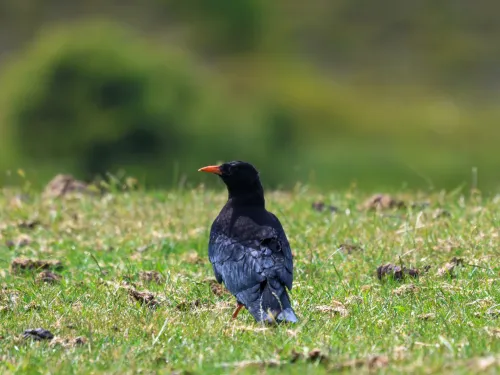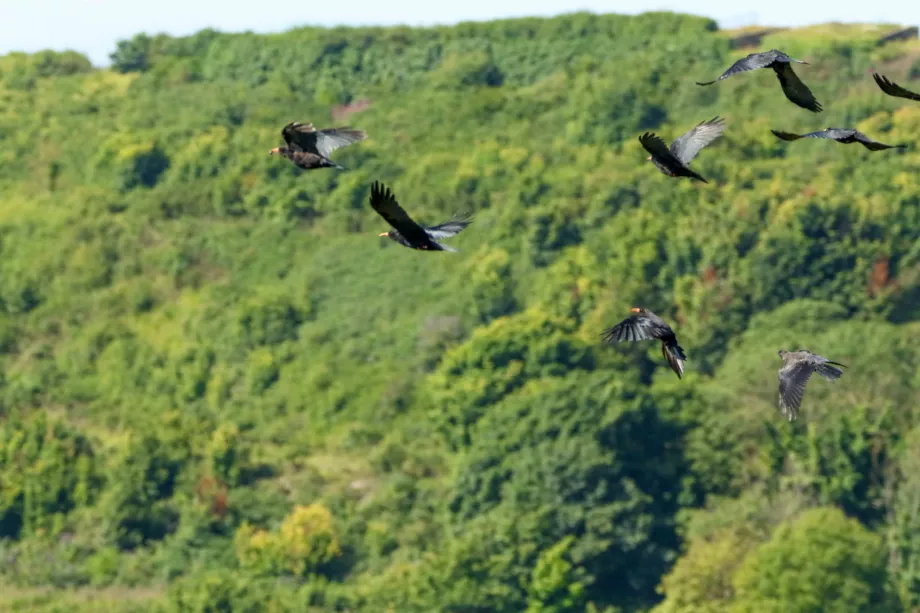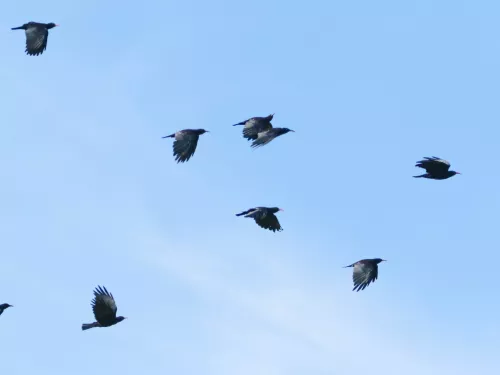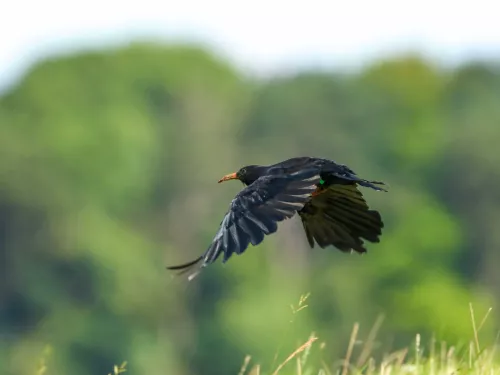
Historic breakthrough as wild-born chough takes to the skies and thrives in Kent for the first time in over 200 years
Conservationists celebrate landmark moment in bid to return red-billed choughs to South East England.


© Tim Horton
Liz Corry is the Chough Release Supervisor for Wildwood Trust:
“The birth of the first wild chick was a milestone we didn’t expect to hit so early. The parents are young themselves but successfully built a nest and incubated the chick, which is a huge achievement.
“A sudden change in the weather led to very strong winds at Dover and we lost sight of the chick. This is the reality of working in the wild with Mother Nature and we know other breeding species have also been affected this season.
“There will be ups and downs in this project, which is why we need to keep the releases going and grow the population, with the hope that they’ll start forming bonds and and pairs and continue to breed..”
The second season of releases is now underway with six female chough, all creche-reared at Wildwood Trust, having taken to the skies over the past few weeks. They’ll soon be joined by six male chough from Paradise Park, potentially taking the total number released in the wild so far to 20. The project plan is to release between 30 and 50 over the course of the five year project. Nationally, it is hoped the Kent population will be the first in a series of planned chough restoration work along the south coast of England which could act as stepping stones to join up remaining isolated and fragmented populations. This is being facilitated by a Southern England steering group, which includes Natural England and number of NGOs.

© Tim Horton
The reintroduction is only made possible through the dedicated work of conservation organisations over the past four decades. Kent Wildlife Trust has worked alongside the likes of the National Trust and White Cliffs Countryside Partnership, to restore chalk grassland habitat and reintroduce conservation grazing management across East Kent.
Paul Hadaway is Director of Conservation and Engagement for Kent Wildlife Trust:
"The red-billed chough reintroduction project in Dover demonstrates that, even with the perilous state of nature and wildlife in this country it is still possible to restore nature and return missing species. The project is rooted in strong science and feasibility work and several decades of concerted habitat restoration. We have laid the foundations for a successful release program that will see this flagship bird reestablished in a county with which it has a long cultural association.
“Creating and connecting habitats at scale has been the starting point for the red-billed chough's journey back. Chalk grassland is an incredibly rare habitat and is considered the UK's equivalent of the rainforest. Grazed chalk grassland can contain as many as forty species per square meter and supports hundreds of species of invertebrates. It is an incredibly important habitat, and conservation grazing management by animals is crucial to maintaining its diversity.
"In Dover, Kent Wildlife Trust has been working with landowners and partner organisations for over forty years to restore chalk grassland. This restoration effort is predicated on returning grazing to areas, preferably with organic livestock. Their dung in turn, contains beetles and other insects, which are essential for the chough's diet.
“Dover sits at the end of a network of several chalk valleys, each flanked by chalk downland habitats that have been progressively restored. Feasibility studies indicated, and the evidence of bird releases to date shows, that we have a critical mass of habitat here making it an ideal location to bring back the chough."

© Tim Horton
The chough was once native to Kent but became extinct in the county more than 200 years ago due to changing farming practices and persecution. The corvid’s long-standing association with Kent is exemplified by its appearance on the coat of arms of Canterbury. According to legend, choughs gained their red beaks and feet after a crow flew into the Cathedral and paddled in the blood of the murdered Archbishop Thomas Becket as he lay dying.
In 2021, a state-of-the-art chough aviary was built at Dover Castle to house four ambassador birds to help visitors learn more about the cultural and ecological significance of the iconic species. The aviary has now been removed but staff from English Heritage says it left a lasting impression on them and visitors. Staff were delighted when last October they made their first wild chough sighting when a pair paid a flying visit to the Castle.
The project has been generously funded by a combination of project partners including Kent Downs National Landscape, Kent residents and local donors. As the project looks forward to future bird releases, more funding is required and project partners are seeking additional support for 2025.

Conservationists celebrate landmark moment in bid to return red-billed choughs to South East England.

Nature-themed crafts on offer for young visitors to the festival

A total of nineteen red-billed chough have now released into the wild as part of a groundbreaking conservation project to return the at-risk species to Kent.